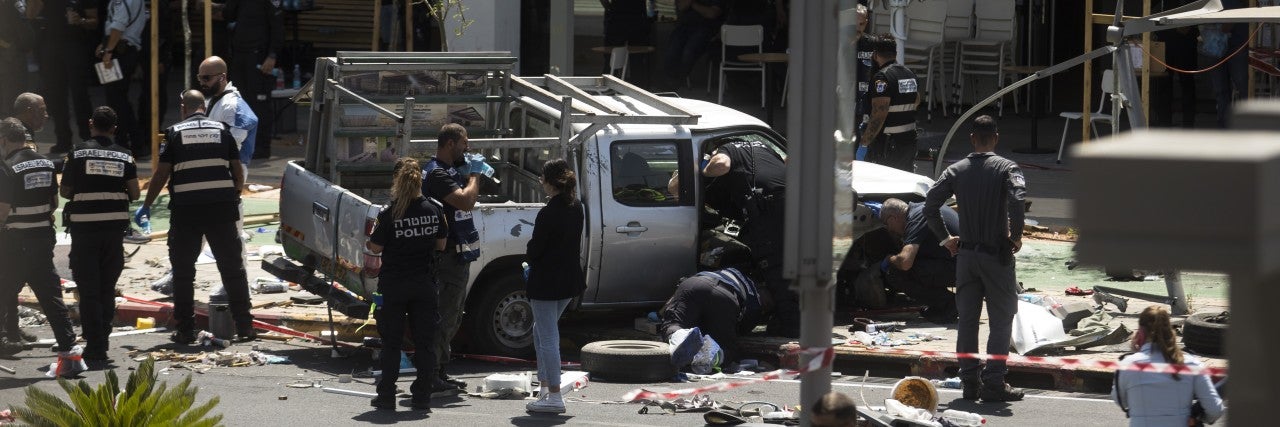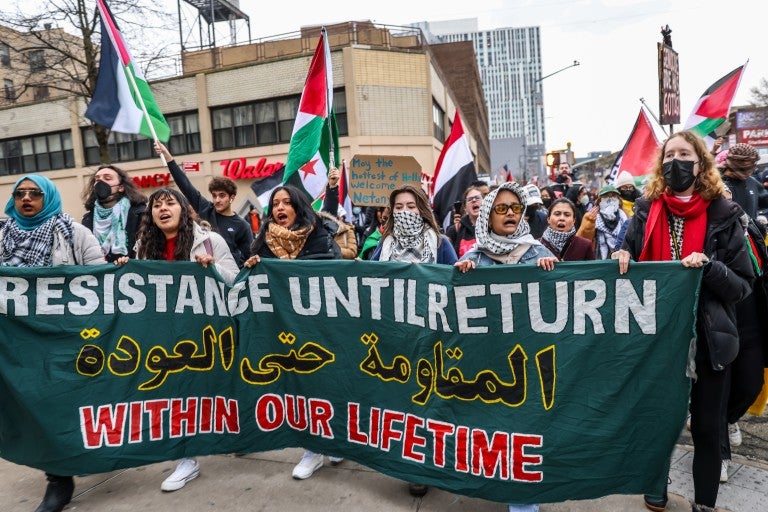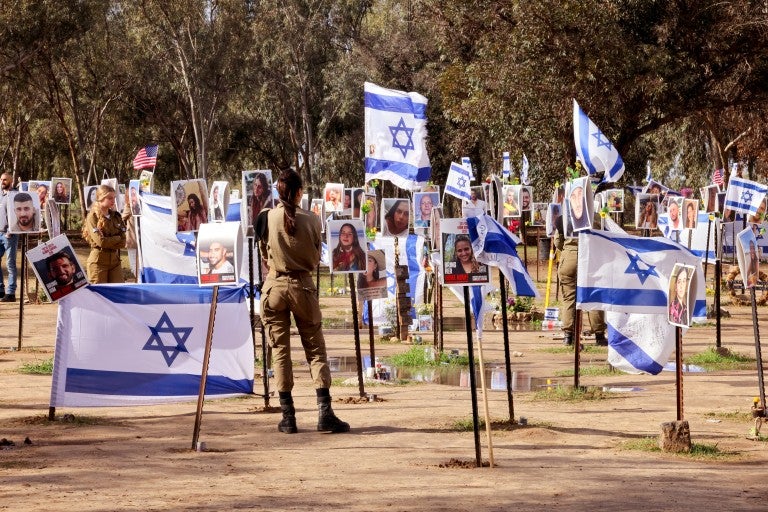July 14, 2023
Media bias is a persistent issue that often surfaces when discussing the Israeli-Palestinian conflict. Whether on the ground or from a distance, reporting on this complex and sensitive topic can be challenging due to the deeply rooted historical, political, and religious factors involved.
Terror groups inside and outside of Israel know this and take full advantage to sway public opinion. As a result, coverage is often selective, stories get framed in a misleading way, or certain perspectives go missing.
News coverage of the Israeli military’s most recent defensive operation to neutralize a terror command center in the West Bank once again demonstrates a lack of understanding about the danger of terrorists operating and hiding among Palestinian civilians, especially the 11,000+ living in the Jenin refugee camp.
“The city of Jenin, and in particular the refugee camp, is a stronghold of terror that exports terrorism to the entire [West Bank] and the home front,” Brig. Gen. Avi Blot, the Chief of the IDF’s West Bank division, told The Times of Israel. The mission in Jenin aimed to thwart and arrest terrorists, destroy enemy infrastructure, and confiscate weapons, he added.
But instead of focusing on Israel’s efforts to thwart terrorists, confiscate weapons, and prevent more civilian deaths, some major media outlets characterized Israel’s targeted attacks against terrorists as attacks on innocent and beleaguered Palestinians – feeding an unequivocally false narrative.
Here are five questions readers and viewers should ask when trying to decipher whether reports about Israel’s counter-terrorism efforts tell the whole story.
1. Does the alleged context in the report leave out significant details or compare apples to oranges?
In addition to its daily news coverage of the IDF’s operation in the Jenin refugee camp, writers at The Washington Post constructed a timeline of events leading up to the Jenin operation.
However, the timeline lacked a considerable amount of context. It failed to mention that Jenin was targeted due to the significant number of terrorists from Jenin who have entered Israel with the intent of murdering Israelis. Just a few days ago, in Bnei Brak, a 16-year-old Palestinian from Jenin stabbed an Israeli man on the street. This omission overlooks the crucial fact that the PA's refusal to address the situation in Jenin left Israel with no choice but to conduct operations on its own.
“Currently, 2023 is on track to be the deadliest year for Palestinians in the West Bank since the United Nations began recording fatalities in 2005, after the last Palestinian uprising,” The Post wrote. “Between Jan. 1 and mid-June, 114 Palestinians were killed by Israeli forces, according to the United Nations; 16 Israelis were killed by Palestinians over the same period.”
Again, the timeline omits the fact that Palestinians have been killed because terrorists are entrenched among civilians, often using their homes, schools, and worship spaces as a shield. In fact, Israeli forces found weapons and ammunition stored by Hamas and Palestinian Islamic Jihad inside a mosque.
Palestinian leadership has done nothing to curb the terrorist activity or protect its own people from indiscriminate attacks.
2. Does the report mention incitement from political, religious, and civil sectors among Palestinian leadership or anti-Israel classroom curricula?
Many young Palestinians participating in the most recent wave of terror are not formally tied to an organized terror group such as Hamas or Palestinian Islamic Jihad. They are individuals, engaging in what they have been taught is a valid form of anti-Israel political protest and aspiring to martyrdom for which their family will be richly rewarded.
“Why is a 13-year-old child thinking of his death before he is thinking of his future?” a school counselor said to The New York Times in a story about young Palestinians feeling so hopeless they have written heartfelt farewell letters to their parents before committing violence against Israeli forces. “We can counsel the students, but we can’t prevent the army from raiding the camp. The occupation is the biggest driver among the youth who ask why they should stop when they are subjected to war and death.”
But in reality, Palestinian leadership has driven these efforts by rewarding terrorists and glorifying them in classrooms, textbooks, and social media. In addition to Hamas and other terror groups, the Palestinian Authority’s official social media accounts have stoked tensions. In April, during the convergence of Ramadan, Passover, and Easter, the PA’s Mission to the United Nations tweeted: “How come Israel is allowed to get away with it? How come it gets away with murder, in broad daylight, & while everyone is watching?”
Meanwhile, the PA disburses more than $350 million to convicted and imprisoned terrorists, as well as to the families of those who have died in connection with killing Jews. This system of providing financial incentives is known as “pay-to-slay.” The more people a terrorist murders, the more money he and his family receive from the government.
3. Does the report mention Iran’s role in fostering the precarious security situation in the West Bank?
For years, Iran has been a staunch supporter of Palestinian terror groups such as Hamas and Palestinian Islamic Jihad. Though based in Gaza, the presence of these terror groups has grown in recent years as the power of the Palestinian Authority (PA) has weakened and these groups seek to replace it. Both terror groups share the Iranian regime’s goal of Israel’s destruction.
Historically, Israeli security has cooperated with the PA, which has controlled portions of the West Bank since the Oslo Accords in 1995. But today, at the expense of the Palestinian residents of Jenin as well as Israelis, there is effectively no PA law enforcement in the city of Jenin. To address this void, Israeli security forces have been conducting near-daily counter-terrorism operations throughout the West Bank, particularly in Jenin, where rocket manufacturing is taking place.
With Iran's backing, Hamas and Palestinian Islamic Jihad have been working to undermine PA rule in the West Bank and utilizing the territory as a base to carry out terror attacks against Israel.
In a recent meeting with Palestinian Islamic Jihad leaders, Supreme Leader Ali Khamenei told Ziyad al-Nakhalah, secretary-general of Palestinian Islamic Jihad, that “the growing power of the resistance groups in the West Bank is the key that can bring the Zionist enemy to its knees, and it is crucial that we continue along this path.”
Complete coverage of Israel’s recent operation in Jenin should mention the role Iran plays in supporting these terror groups. It also should include the simultaneous rocket attacks from Syria and Lebanon that have plagued Israel at the same time troops have been uncovering weapons and terrorists in Jenin.
These are not isolated incidents. They are all part of the same story – the mission of Iran and its terror proxies to eradicate the Jewish state.
4. Does the report engage in or explain classic or contemporary antisemitic tropes?
In a July 4 interview discussing the IDF counter-terrorism operation in Jenin, BBC anchor Anjana Gadgil had the audacity to tell former Israeli Prime Minister Naftali Bennett that “the Israeli forces are happy to kill children.”
“I’m missing something,” Bennett responded. “You know a 17-year-old terrorist can murder civilians. There’s a fundamental difference between what they’re doing, which is explicitly and deliberately targeting civilians and what we’re doing, which is targeting terrorists. That’s exactly the opposite–we’re doing the right thing, they’re killing civilians and the fact that you’re creating a moral equivalence there, or even worse, I think it’s unacceptable.”
Gadgil’s question echoed a centuries-old method of maligning Jews known as “blood libel.” Blood libel charges have evolved from medieval times into a widespread blame of Jews or Israelis intentionally targeting and killing Palestinian children. This enduring form of antisemitism has led to horrific violence, destruction, persecution, and massacres against Jewish individuals and communities. It existed both before and during Nazi propaganda, which demonized Jews by exploiting this trope.
AJC CEO Ted Deutch lambasted BBC for perpetuating such a dangerous falsehood, tweeting: “Israel forces are not ‘happy to kill children’ – they conducted a counter-terror op in Jenin. This is a blood libel and yet another outrageous display of BBC’s bias against Israel. Bravo to former PM Naftali Bennett for highlighting the difference between fact and media distortion.”
Following intervention by the local Jewish community, BBC apologized for how the question posed to Bennett had been crafted.
AJC’s resource Translate Hate sheds light on historic and modern-day applications of the antisemitic blood libel trope.
5. Does the report cite multiple sources and contradict other media reports?
In a television segment about the operation, ABC reported that Israeli forces had fired tear gas inside a Jenin hospital. The allegation didn’t seem accurate, especially considering that other news organizations, including Reuters and AFP, were reporting the IDF’s denial of any fighting in the vicinity of the hospital.
That’s because the article’s author, a New York-based editor, relied solely on a social media post by Doctors Without Borders as their source. Despite lacking additional sources, the writer proceeded to report that the tear gas rendered the emergency room “unusable,” and claimed that the entire hospital, including the ER, was “completely filled with smoke.”


